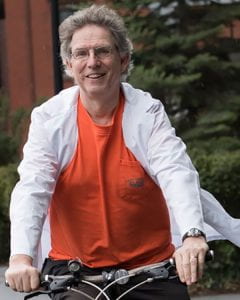
Andrew Murray received his B.A. from Cambridge and his Ph.D. from Harvard, where he worked with Jack Szostak and constructed the first artificial chromosomes. In his postdoctoral work, with Mark Kirschner at UCSF, he showed that cyclin synthesis and destruction regulates the cell division cycle. From 1989 to 2000, Murray was on the faculty of the Physiology department at UCSF and he joined Harvard’s Molecular and Cellular Biology department in 2000.
His group works on the budding yeast, Saccharomyces cerevisiae, often in collaborations with theorists, trying to understand the “rules of the game” that explain how cells reproduce, respond to their environment, and evolve. His current work includes 1) experimentally evolving cells to either produce novel traits, such as multicellularity and circadian clocks, or recover from genetic perturbations, 2) testing our understanding of interesting biological traits by trying to engineer them, and 3) dissecting the regulation of cell biologically interesting processes like energy homeostasis, and the regulation of the cell cycle.
He has served as the Director of the Bauer Center for Genomics Research and its successor the FAS Center for Systems Biology and is currently the Director of the Harvard Center for the Mathematical and Statistical Analysis of Biology. He directed the Bauer Fellows Program and currently directs its successor, the John Harvard Distinguished Science Fellows Program.
In education and mentorship, he is interested in breaking interdisciplinary barriers without sacrificing discipline. As a Howard Hughes Medical Institute Professor, he leads a group of six faculty who teach LS50, Integrated Science, a year-long, double course that introduces a small group of unusually motivated freshman to the natural sciences as an integrated whole, rather than four separate disciplines.